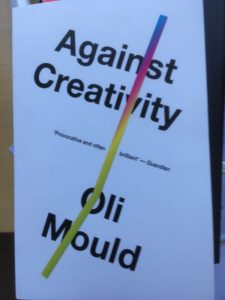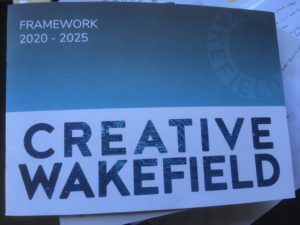
Reading this book (Verso) about the cooption of creativity by capitalism over the past 20 years – ie how everything, everyone, every job, is expected to be “creative”, whatever field it’s in – and thus creativity becomes meaningless, an empty vessel – a form of creativity that seeks to ape the so-called subversive hipster individualistic creativity of silicon valley, but basically serves to reproduce and legitimate 21st century capitalism and consumerism. And we are all now expected to “curate” ourselves online (as I am doing right here), to prove our unceasing creativity (and availability for work) at all hours, inside and outside actual working hours. It’s ironic to be thinking about this at a time when all work in the “creative” sector has been shut down so thoroughly and instantly, a totally non-essential part of our daily lives, while only the work deemed essential (saving lives, providing food and other supplies, maintaining infrastructure) is meant to be continuing. All of us “artists” are sitting at home, contemplating, reassessing our choices and our careers and our value. Ian McEwan was on Radio 4 at lunchtime yesterday, sounding very complacent about how people would be desperate for the arts once this is all over (speaking from his cosy cotswold cottage, I believe). He may be in for a surprise. Certainly, stacking shelves at Sainsburys or driving a delivery van seems a more worthwhile option, and may still do in three/six/nine (delete according to taste) months’ time when we are all released.
Anyway, the book (above) is somewhat rambling, not entirely focussed – at times he seems intoxicated by creative approaches to development and work, while what he doesn’t do is describe or suggest clearly how, as an artist/musician, you might avoid simply being part of capitalism’s ceaseless regeneration and appropriation – when every act of subversion and resistance is so easily coopted into some edgy marketing or urban regeneration project.

And with that in mind, we can look at the new “Creative Wakefield” strategy, launched a few weeks ago, which is a textbook example of the arts-driven development he writes about – a brochure of astonishing platitudes, but apparently a strategy for revitalising Wakefield. Now I myself am a big fan of hipster cafes, jazz clubs, contemporary art galleries, street theatre and so on, and I would very much like the redevelopment of the old (very new) Market and of Rutland Mills in Wakefield to be attractive and successful – but I can see how the possibility is there for gentrification, property development, and all in service of incomers, rather than the actually existing citizens of Wakefield District. So (as a musician) I embrace the development, but wonder how to make it work for all the people, and how much public money gets to be spent on subsidising property developers, rather than supporting essential services for local people in need.
And I’m still not clear, as an artist (currently superfluous), how I personally can resist this.
